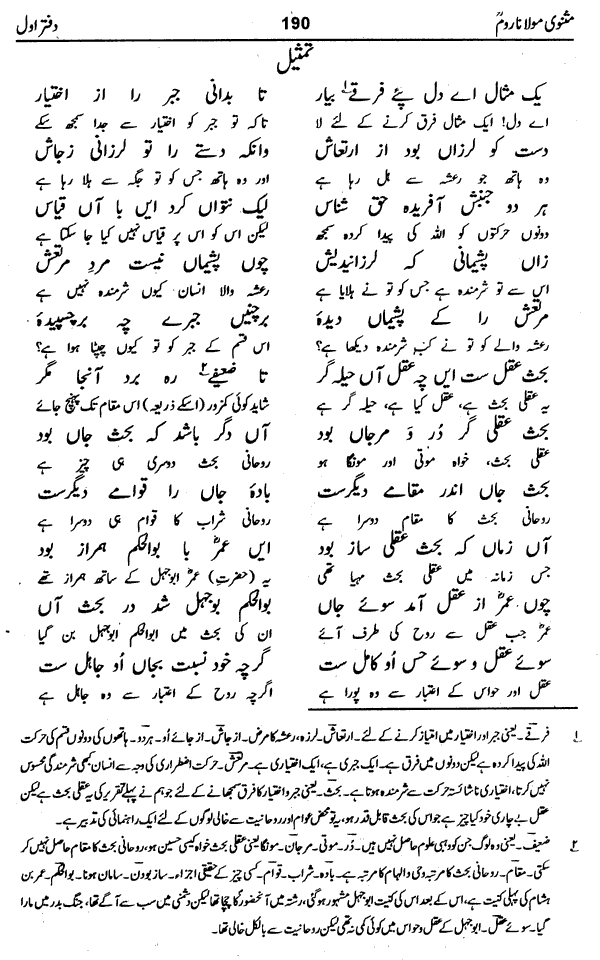How Adam imputed that fault (which he had committed) to himself, saying, “O Lord, we have done wrong,” and how Iblís imputed his own sin to God, saying, “Because Thou hast seduced me.”
1480. Consider both our action and the action of God. Regard our action as existent. This is manifest.
If the action of created beings be not in the midst (obviously existent), then say not to any one, “Why have you acted thus?
The creative act of God brings our actions into existence: our actions are the effects of the creative act of God.
A rational being perceives either the letter (the outer sign) or the (inner) purpose (the spirit): how should he comprehend two accidents at once?
If he goes (turns his mind) to the spirit, he becomes unheedful of the letter: no eye sees forward and backward at the same moment.
1485. At the time when you look in front, how at the same time can you look behind you? Recognise this.
Inasmuch as the soul does not comprehend (both) the letter and the spirit, how should the soul be the creator of them both?
O son, (only) God comprehends both: the (one) action does not hinder Him from the other action.
Satan said Because Thou hast seduced me: the vile Devil concealed his own act.
Adam said We have done wrong unto ourselves: he was not, like us, unheedful of the action of God.
1490. From respect he concealed it (the action of God) in (regard to) the sin: by casting the sin upon himself he ate fruit (was blessed).
After his repentance, He (God) said to him, “O Adam, did not I create in thee that sin and (those) tribulations?
Was it not My fore-ordainment and destiny? How didst thou conceal that at the time of excusing thyself?”
He (Adam) said, “I was afraid, (so) I did not let respect go (did not fail to observe due respect).” He (God) said, “I too have observed it towards thee.”
Whoever brings reverence gets reverence (in return): whoever brings sugar eats almond-cake.
1495. For whom are the good women? For the good men. Treat thy friend with honour; offend (him) and see (what will happen).
O heart, bring (forward) a parable for the sake of (illustrating) a difference, that thou mayst know (what distinguishes) compulsion from freewill.
(Take the case of) a hand that is shaking from (morbid or involuntary) tremor and (the case of) a person whose hand you cause to shake (by knocking it away) from its place.
Know that both (these) movements are created by God, but it is impossible to compare the latter with the former.
You are sorry for having caused it (his hand) to shake: how is the man afflicted with (a morbid) tremor not sorry?
1500. This is the intellectual quest. What is (the use of such a) quest, O ingenious one?
That perchance (by its means) a man of weak understanding may find his way to that place (gain some idea of the truth).
(Yet) the intellectual quest, though it be (fine as) pearls and coral, is other than the spiritual quest.
The spiritual quest is on another plane: the spiritual wine has another consistency.
At the time when the intellectual quest was in keeping (with the circumstances), this ‘Umar was intimate with Bu ’l-Hakam,
(But) when ‘Umar went away from intellect towards spirit, Bu ’l-Hakam became Bú Jahl (the father of ignorance) in searching into that (subject).
1505. He is perfect on the side of sense-perception and understanding, though indeed he is ignorant in regard to the spirit.
Know that the quest of the intellect and the senses is (concerned with) effects or secondary causes. The spiritual quest is either wonder or the father of wonder (either wonderful or beyond wonder).
The illumination of the spirit comes: (then) there remains not, O thou who seekest illumination, conclusion and premise or that
which contradicts (a statement) (or) that which renders (its acceptance) necessary,
Because the seer on whom His (God's) Light is dawning is quite independent of the (logical) proof which resembles a (blind man's) staff.
Once more we come back to the tale: when, indeed, did we go forth from the tale?




No comments:
Post a Comment